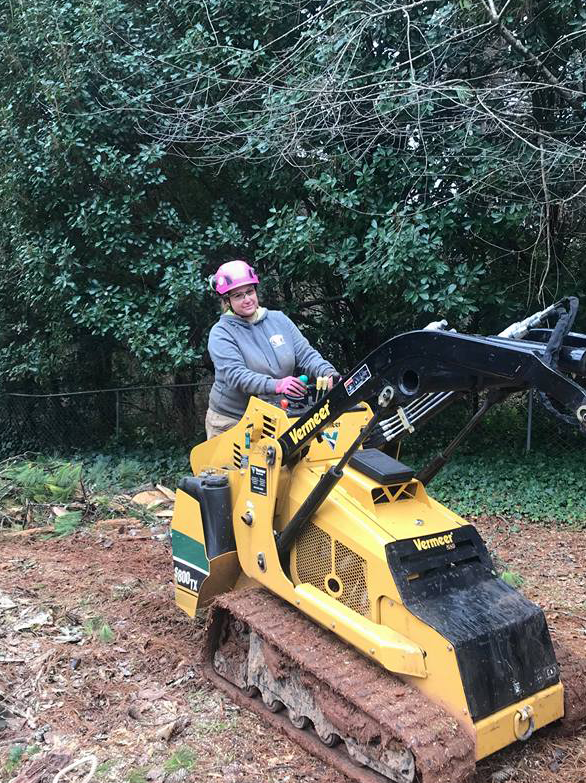It’s true — the tree care industry has historically employed more men than women, but those statistics haven’t stopped Arbor Tech, LLC employee Jennifer Chambless from anything. In fact, Chambless, who recently passed her ISA Certified Arborist® exam, is encouraging men and women alike to ignore gender stereotypes to achieve their goals.
With such a prestigious certification accomplishment under her belt, many ask: What made you want to enter the tree care industry in the first place?
“I’ve been best friends with Barry Collins, owner of Arbor Tech for years. So when I lost my job due to corporate downsizing Barry said, ‘Why don’t you just come out and work with me?’ I’ve been here ever since,” Chambless said.
Arbor Tech is a full-service tree care business located in Moreland, Georgia. With a master’s degree in business administration, Chambless initially joined the team to help with billing and administration work, but her role eventually expanded.
“I started going to some of the estimates with the team to learn more about that process — like how they price out different things — and the next thing you know, I was helping them drag limbs and feed the chipper and now I have my own chainsaw,” Chambless said. “I even help with the equipment maintenance aspect of things from time to time.”
As Chambless became more hands-on at jobsites, Collins encouraged her to look into an ISA certification.
“I knew (becoming certified) would help the company, and I love learning new things, so the idea of learning more about trees was very appealing,” Chambless said. “Any opportunity to learn — I’m all about that. Plus, since they had been letting me loose to do some of the estimating for our customers, I wanted to become more knowledgeable.”
To earn an ISA Certified Arborist® credential, applicants must be trained in all aspects of arboriculture. You need to meet all the requirements to be eligible to take the exam — this includes three or more years of full-time, eligible, practical work experience in arboriculture and/or a degree in the field of arboriculture, horticulture, landscape architecture or forestry from a regionally accredited educational institute.
The test is divided into 10 areas of knowledge:
- Soil management
- Identification and selection
- Installation and establishment
- Safe work practices
- Tree biology
- Pruning
- Diagnosis and treatment
- Urban forestry
- Tree protection
- Tree risk management
Once you’ve received approval to take the test, ISA provides online resources such as study guides and practice tests to help you prepare. To obtain the credential, you must achieve a minimum 76 percent score.
“I took the time to slowly work through the chapters to learn all the curriculum,” Chambless explained. “You have to be pretty self-disciplined because it’s a pretty darn hard test.”
Chambless dedicated six months to studying before taking the 200-question, timed exam. She said her certification just added to her confidence out in the field.
“I like the feeling of showing that, as a female, I can do these tasks,” Chambless said. “I also like being able to talk trees with people and share my knowledge.”
Chambless wants other women to know they can work in tree care too. All they have to do is try.
“Don’t worry that it’s mostly men — don’t let that stop you. Let it encourage you to grow more within yourself,” Chambless said. “Five years ago, I never would have seen myself being outside working on these jobsites and being able to hold my own. Now that I’m here it drives me forward to want to learn more and I really enjoy it.”
To view more articles on tree care education and training, visit the Tree care rental and landscape blog.
Vermeer, the Vermeer logo and Equipped to Do More are trademarks of Vermeer Manufacturing Company in the U.S. and/or other countries. © 2017 Vermeer Corporation. All Rights Reserved.
